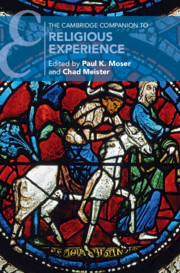Book contents
- The Cambridge Companion to Religious Experience
- Cambridge Companions to Religion
- The Cambridge Companion to Religious Experience
- Copyright page
- Contents
- Figures
- Contributors
- Preface
- Introduction
- Part I Characterizing Religious Experience
- 1 Psychology of Religion Approaches to the Study of Religious Experience
- 2 Philosophy of Religion Approaches to the Study of Religious Experience
- 3 Theology, Religious Diversity, and Religious Experience
- Part II Religious Experience in Traditional Monotheism
- Part III Religious Experience Outside Traditional Monotheism
- Part IV Prominent Themes and Challenges
- Index
- Cambridge Companions to Religion
- References
2 - Philosophy of Religion Approaches to the Study of Religious Experience
from Part I - Characterizing Religious Experience
Published online by Cambridge University Press: 20 June 2020
- The Cambridge Companion to Religious Experience
- Cambridge Companions to Religion
- The Cambridge Companion to Religious Experience
- Copyright page
- Contents
- Figures
- Contributors
- Preface
- Introduction
- Part I Characterizing Religious Experience
- 1 Psychology of Religion Approaches to the Study of Religious Experience
- 2 Philosophy of Religion Approaches to the Study of Religious Experience
- 3 Theology, Religious Diversity, and Religious Experience
- Part II Religious Experience in Traditional Monotheism
- Part III Religious Experience Outside Traditional Monotheism
- Part IV Prominent Themes and Challenges
- Index
- Cambridge Companions to Religion
- References
Summary
Wiebe examines a historical shift from deductive inference to inductive inference and then to abductive methodological approaches in philosophy and science, with regard to their bearing on religious experience. In addition, he remarks on a "theory of Spirits" that postulates theoretical entities for explanatory purposes in connection with religious phenomena, and he suggests that a new epistemology of religious experience is needed for adequate explanatory purposes.
Keywords
- Type
- Chapter
- Information
- The Cambridge Companion to Religious Experience , pp. 55 - 75Publisher: Cambridge University PressPrint publication year: 2020



